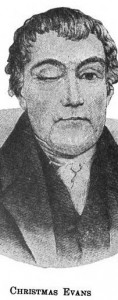 He was born on December 25, 1766, so his parents named him Christmas. He was a tough kid (a farm worker who remained illiterate well into his teenage years), but he became a Christian at age 17, and grew up to become famous as “the one-eyed preacher of Wales.” The Encyclopedia Brittanica entry on him notes that “his chief characteristic was a vivid and affluent imagination, which absorbed and controlled all his other powers, and earned for him the name of the “Bunyan of Wales.”
He was born on December 25, 1766, so his parents named him Christmas. He was a tough kid (a farm worker who remained illiterate well into his teenage years), but he became a Christian at age 17, and grew up to become famous as “the one-eyed preacher of Wales.” The Encyclopedia Brittanica entry on him notes that “his chief characteristic was a vivid and affluent imagination, which absorbed and controlled all his other powers, and earned for him the name of the “Bunyan of Wales.”
Christmas Evans is remembered as one of the greatest preachers in the history of Wales, and from his published sermons it’s easy to see why. Much is lost in translation and publication: People who can read his Welsh say it is untranslatably powerful, and his contemporaries reported that his personal presence was riveting. Phrases like “He fixed his one enormous eye upon me, and it stared into my soul as no two-eyed man could” are common in the reports.
At least in the published sermons, Evans tended to preach very doctrinally. But “doctrinal” didn’t mean “dry” for Evans. His firm grasp on the great themes of Christian theology gave his sermons backbone, but his oracular use of the language of Scripture itself met his evangelical spiritual instincts. The results were homiletically explosive.
Here is an excerpt from his sermon “The Father and Son Glorified.”
In the salvation of sinners by Jesus Christ all the conditions and preparatives were essential to the completeness and glory of the scheme. The Son of God must consent to undertake our cause, and become our substitute –the promise must be given to Adam, and frequently repeated to the patriarchs –bloody sacrifices must be instituted, to typify the vicarious sufferings of Messiah –a long line of prophets must foretell His advent, and the glory of His kingdom –He must be born in Bethlehem, crucified on Calvary, and buried in Joseph’s new tomb –must rise from the dead, ascend to the right hand of the Father, and send down the Holy Spirit to guide and sanctify His Church. Without all these circumstances, the economy of redemption would have been incomplete and inefficient. The last link in the chain is the mission and work of the Holy Spirit. This is quite as important as any of the rest.
The Son glorifies the Father. I hear him praying in the garden: ‘Father, I have glorified Thee on earth; I have finished the work which Thou gavest me to do.’ I hear Him again, amidst the supernatural gloom of Calvary, with a voice that rings through the dominions of death, and hell, crying –‘It is finished!’
What mighty achievement hast Thou finished today, blessed Jesus? and how have Thine unknown agony, and shameful death, glorified the Father?
Evans fills the next several pages with the voice of Jesus, putting into his mouth the themes of the rest of Scripture: I have raised up my Father’s law, I have raised up my Father’s name, I have raised up my Father’s image, and so on.
Evans brings it home by reaching for the theological peak, where the work of the three persons comes together:
The Holy Spirit glorifies Father and Son together. He is procured for the world by the blood of the Son, and sent into the world by the authority of the Father, so that both are alike represented in His mission, and equally glorified in His office. The gracious things which the Father gave into the hands of the Son when He descended from heaven, the Son gave into the hands of the Spirit when He returned to heaven ‘All things that the Father hath are mine, and He shall take of mine, and shall show it unto you.’ This is the object of the Spirit’s advent: the communication of the things of Christ to men. What are the things of Christ? His merit, His mercy, His image, His Gospel, His promises, all the gifts of His grace, all the treasures of His love, and all the immunities of eternal redemption. These the Father hath given to the Son, as the great Trustee of the Church, and the Son hath given them to the Spirit, as the appointed Agent of their communication.